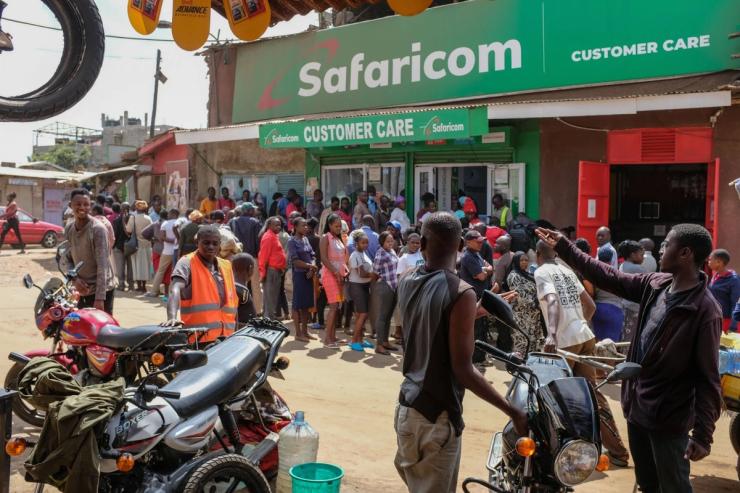The News
Editor’s note: The original version of this story was based on comments made by Safaricom’s chief technology officer in an interview. The story, and the analysis therein, has been updated following an official statement by the company that it is targeting 70 million customers across the group in five years and not in Ethiopia alone, as originally stated by the CTO.
East African telecoms giant Safaricom aims to reach 70 million subscribers by 2030, the company told Semafor.
Safaricom currently has around 60 million customers. Some 50 million are in Kenya and a further 10 million are in Ethiopia.
Following the privatization of state-owned Ethio Telecom, Safaricom won Ethiopia’s first private telecoms license in 2021 and launched in the country the following year.
James Maitai, the company’s chief technology officer, in August told Semafor that the company targeted major growth in Ethiopia over the next five years, driven by the move to digital payments in Africa’s second-most populous country of 120 million people. The company’s M-Pesa mobile money platform is widely used in Kenya.
“In the next five years we should be able to talk of over 70 million subscribers, because it’s a big country,” said Maitai, during a wide-ranging interview. “Cash is over 95% cash usage which means there is a huge opportunity to offer M-Pesa for payment and other financial services.”
Safaricom subsequently informed Semafor that “the 70 million subscribers are Group projections and not Ethiopia.”
Know More
Ethiopia’s telecoms industry was widely seen as a major prize when Prime Minister Abiy Ahmed’s government announced the privatization of Ethio Telecom after he took office in 2018. The move was part of Abiy’s broader liberalization of the economy.
But Safaricom initially grappled with currency volatility and insecurity. A shortage of the foreign currency required to bring in equipment was among the initial obstacles that made it difficult to set up in Ethiopia, said the CTO.
However, in May it said its overall earnings could increase by up to 50% this financial year because losses in Ethiopia were projected to fall steeply.
“The initial problem was technology set-up. This is behind us,” said Maitai. “Now we know how to build infrastructure fast.” He said much of the expansion plan in Ethiopia hinged on broadening its network coverage by more than doubling its base stations from less than 4,000 to more than 10,000 within the next 10 years.
Step Back
Safaricom, which is partly owned by South Africa’s Vodacom and the UK’s Vodafone, is by some distance the biggest telecoms company in Kenya, East Africa’s biggest economy. It has around 65% market share of SIM card subscriptions, although its main competitor Airtel has been closing the gap in recent months.
The company’s strength in Kenya is most pronounced in M-Pesa. The service, launched in 2007, is used by 90% of the country’s mobile money account holders.
Alexis’s view
Establishing the infrastructure needed to scale up the business in Ethiopia was always going to be tough. The multiple crises of the Birr’s devaluation, surging inflation, a foreign exchange scarcity, and the 2020-2022 war in the northern Tigray region, only added to the underlying challenge of setting up in a relatively closed economy.
Safaricom dominates the Kenyan market, so growth in the next few years is likely to come from Ethiopia. Progress in the Ethiopian market will depend on how the country adapts to the economic overhaul of recent years. The liberalization of Ethiopia’s economy has been swift and it still remains to be seen how it’ll play out. The currency was floated only a year ago and the IMF warned last month that the economic policy overhaul faces challenges from declining donor support. Meanwhile, an insurgency in the central Oromia region is emblematic of the febrile security situation in part of the country that could undermine Safaricom’s push to extend the network of masts needed to broaden coverage.
The other crucial factor is the role of Ethio Telecom, which has 83 million subscribers. Safaricom could find it hard to scale up rapidly when faced with strong brand recognition and the former monopoly’s close ties to the national telecoms regulator.
The View From Nigeria
Nigeria for many years lagged behind other African countries in the uptake of digital financial services, largely because the central bank did not allow the largest telecoms companies, MTN and Airtel, to have mobile money licenses until 2022.
Michael Wiegand, director of inclusive financial systems at the Gates Foundation, told Semafor that Nigeria was “fairly late in opening up to mobile network operators.” Some 45% of Nigerian adults had an account in 2021, said Wiegand, adding that this remained largely unchanged since 2014. But he said that figure rose to 63% in 2024. “Just allowing mobile network operators to offer accounts enabled a huge growth in participation,” he said.
Notable
- Ethio Telecom reported an 80% rise in annual pretax profit last month, which it said was driven by an expansion of its network and an increase in customers.
- Mobile subscriber penetration in Africa is expected to reach 50% by 2030, up from 44% in 2023, predicted consultancy McKinsey in a recent report that said affordability of handsets and data remained the biggest barrier to growth.


